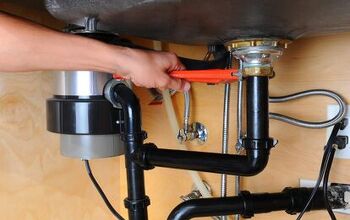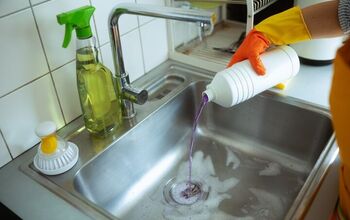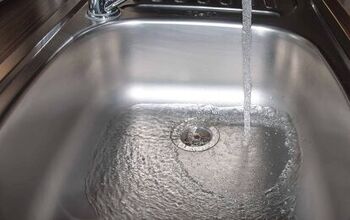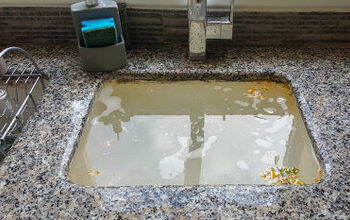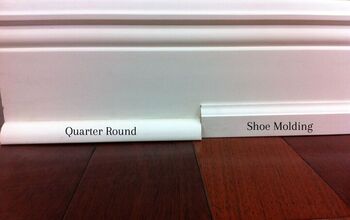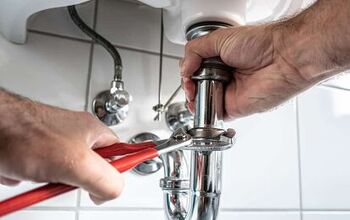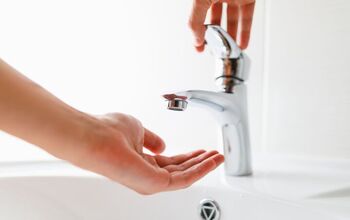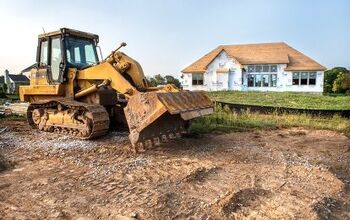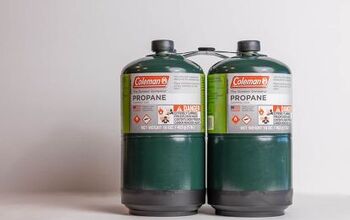How To Clean A Kitchen Sink Drain

It is necessary to clean your kitchen sink drain to prevent foul odors and clogs. That doesn’t mean that it’s fun, however, and there’s not always an obvious way to do it. Understandably, many homeowners struggle with how to clean their kitchen sink drain and keep it clean.
Pour ½ gallon of boiling water down your kitchen sink drain to clean it. Mix ½ cup of baking soda with 1 cup of vinegar, pour the mixture down your drain and plug the drain opening for 10 minutes. Wash the solution down your sink with boiling water and sprinkle some lemon juice and essential oils in the drain.
Use baking soda once a week to prevent bad smells from coming out of your kitchen sink drain. Only use a chemical cleaner as a last resort and follow the directions so you don’t damage your pipes. Follow along as we explore how to clean your kitchen sink drain in no time.
What Is The Best Way To Clean a Sink Drain?
You can clean a kitchen sink drain with everything from hot water and baking soda to ice and lemon juice. Let’s take a look at the easiest ways to clean your kitchen sink drain.
Naturally
Many homeowners try to clean their kitchen sink drain naturally without any chemicals. This can work in many cases, and the best natural method is to use hot water. Fill a pot with water, place it on your stove, and set the burner to high.
Boil at least ½ gallon of water if not more so that you have enough to clean your sink drain. Put on oven mitts before you grab the pot of boiling water to avoid injury. Now, you can pour the hot water down your kitchen sink drain to hopefully clear clogs and debris in the line.
Use all of the water with 2-3 pours and quickly pour some baking soda down the drain. The baking soda will help with the odor and can stop bacteria from growing quickly.
Baking Soda and Vinegar
Baking soda and vinegar are classic household items that you can use to clean a kitchen sink drain. The reaction when you combine baking soda and vinegar is enough to clean even the dirtiest sinks. Make sure that you use white vinegar because that will yield the best results.
This is a great fix to try after you go the natural route and use boiling water. After you’ve done that, pour ½ cup of baking soda and 1 cup of white vinegar down the drain. You will hear fizzing and popping within your sink drain, and that means that it’s working.
Place a drain plug or paper towel over the drain. Let the mixture sit in the drain for 5-10 minutes, then rinse the drain with hot or boiling water. Your drain should smell better, and water should freely move through it.
Chemical Cleaner
Chemical cleaners are readily available, but you shouldn’t use them in every scenario. Only clean your kitchen sink drain with a chemical cleaner if the clog is severe and nothing else works. Carefully read the directions on the back of your chemical cleaner before you use it.
Most of them, such as Drano, recommend that you only let the cleaner sit in the drain for 10-15 minutes. This is because they typically include corrosive chemicals that can damage your drain if you let them sit for too long. You can let some chemical cleaners sit for up to 30 minutes before you rinse, but you shouldn’t do that all the time.
Rinse the cleaner down the drain with hot water once you have let it sit. Never leave corrosive chemicals in your kitchen sink drain overnight or you could damage the pipes.
Ice
Ice may seem like an unlikely remedy, but it’s a great way to clean a kitchen sink drain. Cover a few ice cubes with thick salt and push them down the sink drain. This will slowly clean the drain, pipe, and even your disposal blades as the ice melts.
You can also pour salt down the drain before you insert the ice cubes. This method is a better option if your sink drain is quite dirty and draining slowly. Don’t use too much salt or else you could potentially make the problem worse.
However, salt is an important element because it can help scrub debris and grime from your drain and disposal. Perform this fix after you run hot water down the drain if you want to get the best results.
How To Keep Your Kitchen Sink Clean
Ideally, you should take preventative steps so that your kitchen drain doesn’t smell bad. There is no way to ensure that bad odors won’t come from your sink, but there are several ways to reduce the risk. Let’s take a look at the best ways to stop your kitchen sink from smelling.
Lemons
You can use lemons themselves to clean your kitchen sink. Cut a lemon in half and pour some thick salt down your drain. Now, scrub the kitchen sink with each half of the lemon as if they are typical sponges.
The juice will come out of each half of the lemon and slowly rinse down the drain. It will run over the salt in your kitchen sink drain and scrub it clean. Let the lemon juice sit in the sink for 5-10 minutes, then rinse the sink and drain with hot water.
Essential Oils
Mix some essential oil into boiling water and pour it down your kitchen sink drain. The warm water will break up sludge and debris while the essential oils make your drain smell better. Essential oils aren’t harmful to your sink drain, especially when you dilute them in water. Tea tree, lavender, and mint essential oils can help prevent kitchen sink drain odors.
Regularly Use Baking Soda
You can prevent your kitchen sink from smelling bad and getting clogged if you regularly use baking soda. One of the best prevention methods is to put baking soda in your sink drain once per week. There is no limit to how often you can do this, however, so you can use baking soda as needed.
The baking soda will slowly wash down the sink drain as you use your faucet. Until then, it will help absorb odors and prevent bacteria from thriving in your kitchen sink drain.
Summing It Up
The best way to clean your kitchen sink drain is with baking soda and vinegar. Use ½ cup baking soda and 1 cup of white vinegar for the best results. Let the mixture sit for up to 10 minutes, then rinse it down the drain with boiling water to unclog your drain.
Chemical cleaners such as Drano can also help remove clogs and bad odors. Never let a chemical cleaner sit in your kitchen sink drain for longer than the directions say so you don’t damage your pipes. Otherwise, you can use boiling water, lemon juice, and essential oils if you don’t want to use any chemicals.
Related Guides

Nick Durante is a professional writer with a primary focus on home improvement. When he is not writing about home improvement or taking on projects around the house, he likes to read and create art. He is always looking towards the newest trends in home improvement.
More by Nick Durante










